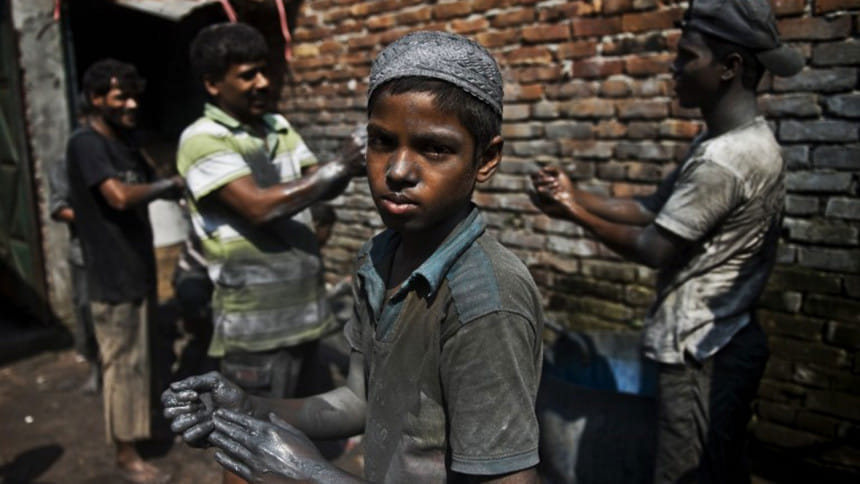Nobody’s children

June 12—World Day against Child Labour—wasn't supposed to be just another Friday. It would have been the launch day of my first book, containing stories about street children. Some of these children are school dropouts. Some have never gone to school. Some have lost their families and their homes; going to school is the last thing on their mind. This last group are the most vulnerable—the "hard to reach" children. I call them "nobody's children", because sadly, that is just what they've become to us.
The 2025 Sustainable Development Goal of eradicating all child labour seems a far cry now, but wasn't it already? We have social safety net programmes such as the Street Children Rehabilitation Programme. There was an initiative by Bangladesh Bank in 2014 to provide street children with bank accounts to save the income they earn. Are these initiatives working? Can we do better? I believe we can, especially if we focus on three specific interventions.
The first is to develop a database of street children to keep track of them. This would mean figuring out a way to give the children shelter so that they do not have to move around to survive. It will be tricky. Some street children have families but cannot shelter with them, and others have no family at all. We need to incorporate all the different categories and provide each child with the support they need.
The second immediate need is a specialised education programme. We will have to design a sustainable model of how to protect, provide for and educate street children. One size will not fit all. Our best option is to design a programme that would be a cross between a foster care system and a specialised school where education is tailored to each child's level and capacity.
Here is where we have the scope to be innovative. For example, we can adopt a "big buddy" programme that has proved successful in many countries. The main idea is for privileged children to tutor and mentor underprivileged children. Studies have shown that this benefits both groups. Getting the ten highest-performing students from classes eight to 12 in every school to be a "big buddy" to a homeless child is a fantastic way to teach the students empathy, humanity and responsibility. Just imagine the number of street children who may benefit from such pairings as well. The foster home would take care of food, shelter and safety, and there are ways to solve the problem of space regarding shelter. Can't schools, especially the larger ones, donate two of their classrooms for 15 street children to sleep in? We could even have "child-mobiles"—caravan style homes—with beds and hygiene facilities.
Two important pieces of the puzzle are—how to empower these children and make sure they can support themselves when they become adults, and how to fund all this. For the former, vocational skills training may need to become a part of the education programme, but not as a substitute to education itself. Why? A scene from the movie Super 30, based on the life of Indian mathematics teacher Anand Kumar, comes to mind—where a girl from the slums dreams of becoming a scientist. And why shouldn't she? The aspirations of any child need not be limited and we should not fit them into a box with a set list of destinations. A street child can be part of our demographic dividend too.
In terms of financing, we may need to accept that laws banning child labour are useless unless we facilitate its enforcement. For sustainability, we may need to consider a fee to be a part of the specialised education programme. Charitable sponsors would help, or it may also be the case that a street child would have to work part-time in a safe and secure job. There is scope for local entrepreneurship to bloom here, and there should be strict rules to ascertain safe labour for the children.
My final proposal is to allocate a separate portion of the next national budget for the education of homeless children. Create a separate allocation for them not only as a social safety net programme, but in the budget allocated for education as well.
I often have dreams about the street children I knew. In one dream, there's a two-decker red bus, the top deck with warm beds and the bottom with tables with food, shelves of books, a filter for drinking water. Some forgotten children live in the bus; they go to their special schools in the morning and sell books from the bus by day. Can we make something like this a reality? There are many NGOs who have been working for years to help street children. It cannot remain as philanthropy anymore. We will only be able to make a real sustainable difference if we can institutionalise our ideas. It has to be a system, not a charity.
There are more pros than cons. Such a programme for street children has the potential to create thousands of new jobs. It would require a large pool of teachers, caregivers and mental health experts. The first challenge is to change our mindsets. We have to make the job of teaching a street child attractive, and give it the high remuneration and elevated social status it deserves. Teaching a street child or being a primary school teacher should not be a transition before switching to a better job. It is the better job. That's how we should set the stage.
I've learnt that ideas, no matter how important, are easier, while implementation in a country like ours requires the attention of the big fish. We tried, through our organisation Blue Roses Foundation, but couldn't persist due to lack of capital. I then began to write down the stories of the children I'd known. I asked them whether they would give me the honour of being their voice and they poured their hearts out to me. Many years later, the stories are about to become the book Nobody's Children. This book is for the world to hear the unheard children. With the blessings of my publisher UPL, I am pledging my writer's cut from the book sales to sustainable efforts for the betterment of street children. As Valerie Taylor, founder of Centre for the Rehabilitation of the Paralysed (CRP), who very kindly wrote the foreword to the book, says, "May we care enough so that 'nobody's children' someday become 'everybody's children'".
If you want to become a part of the fight to ensure better lives for street children, please email [email protected].
Rubaiya Murshed is Lecturer at the Department of Economics, University of Dhaka.

 For all latest news, follow The Daily Star's Google News channel.
For all latest news, follow The Daily Star's Google News channel. 



Comments